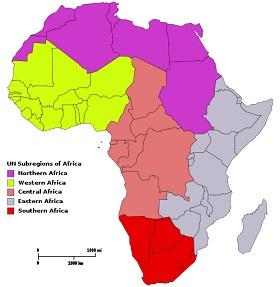Using AI to control energy for indoor agriculture
30 September 2024
Published online 24 October 2011

Algeria has beaten off competition from Libya to land one of the campuses of the proposed Pan African University (PAU), an African Union (AU) initiative aimed at redressing the poor standard of education in Africa by increasing postgraduate research across the continent.
The neighbouring nations have jostled for over a year to become home of the water, energy sciences and climate change campus.
The AU had first awarded Algeria the campus in June 2010 but Libya contested the decision. Ministers attending the Conference of Ministers of Education of the African Union (COMEDAF), which was held in Addis Ababa on 13 May 2011, instructed the two national governments to negotiate and agree on a host for the Northern Africa campus.
The old Libyan regime had a change of heart and informed COMEDAF that it withdrew its bid to host the PAU node in May 2011 without giving a reason, says Beatrice Njenga, the head of the division of education at the African Union.
Libya may still get the chance to be part of PAU if it resolves its internal conflict, since countries "will have an opportunity to apply to host satellite centres," Njenga explains. Each campus will have a number of these centres located in different parts of the continent.
The Algerian ministry of higher education and scientific research has kick started plans for the PAU campus.
Mokhtar Sellami, director of research programming and prospective studies at the ministry, says the country has decided not to host the node in a specific Algerian university as previously planned.
It will get its own campus and will operate independently. Till this is finalized, its students will use research laboratories and equipment of 11 Algerian universities.
"When it's inside an institution it will use the equipment of the institution. We didn't like that," he said in a telephone interview.
The 11 universities have formed a network to support the PAU node, which is expected to open its doors to an initial 40 PhD and 50 master's students in September 2012.
"By September we will not have equipment so we'll need to use that of the 11 universities," Sellami says.
Sellami says a meeting to launch the node will be held in March next year, where a call for both lecturer and student applicants from across the continent will be issues.
A curriculum for the university will be designed after the meeting.
Sellami says they are expecting to recruit 40 lecturers initially, increasing the number as more students enrol.
The AU commissioner for human resources, science and technology, Jean-Pierre Ezin, will visit Algeria 5 – 7 December this year to "inspect the institutions" involved in the PAU, according to Callistus Ogol, the PAU focal officer at AU who is coordinating the project.
The Algerian campus will be one of five campuses across west, central, north, east and southern Africa that will form the PAU.
PAU's earth and life sciences campus will be based at The University of Ibadan, Nigeria. The sciences, technology and innovation campus of PAU will be in east Africa at the Jomo Kenyatta University of Agriculture and Technology, Kenya. Cameroon in central Africa will have the governance, humanities and social sciences campus.
The AU is yet to select the host for the southern Africa space sciences campus.
doi:10.1038/nmiddleeast.2011.143
Stay connected: